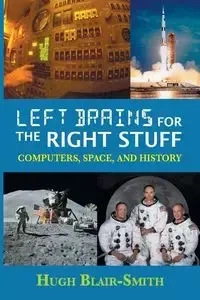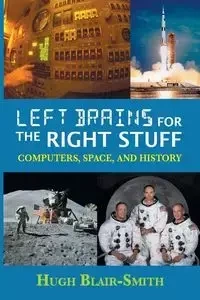Left Brains for the Right Stuff - Hugh Blair-Smith
- Computers, Space, and History
What made the Space Race possible? What made it necessary? How close a race was it? And what did it achieve? The answers are connected in surprising ways. Left Brains for the Right Stuff briefly summarizes the history of three technologies-rockets, navigation, and computers-and recounts how they were woven into the rise and rivalry of superpowers in the twentieth century. President John F. Kennedy inherited a small Space Race and transformed it into a Moon Race by creating the Apollo program ('... achieving the goal, before this decade is out, of landing a man on the moon ...'). To make it an 'offer' the Soviet Union couldn't refuse, he added, 'We choose to go to the moon ... not because [it is] easy, but because [it is] hard.' Apollo won the Moon Race and, combined with the Space Shuttle, won the Space Race, which did much to win the Cold War and preserve the momentum of American leadership that had been created in World War II. Many big companies worked on those programs, and so did a small academic research laboratory. At Massachusetts Institute of Technology (MIT), the Instrumentation Laboratory ('the Lab') was the creation of one man, Charles Stark 'Doc' Draper, who invented inertial navigation. Author Hugh Blair-Smith was a staff engineer at the Lab from 1959 through 1981. Trained as an electronic engineer and computer scientist, his two-pronged expertise contributed to both the hardware of spacecraft computers and the programming that had to make the most of their limited resources. This is a history, an inside story, and a riveting account of the Space Race, studded with startling insights into causes and effects. In those exciting years, Blair-Smith joined many thousands of people in cooperating gladly, generously, and passionately to add electronic left brains to the Right Stuff. Their creations answered the long-sought quest for 'a moral equivalent to war.'
EAN: 9780996434539




What made the Space Race possible? What made it necessary? How close a race was it? And what did it achieve? The answers are connected in surprising ways. Left Brains for the Right Stuff briefly summarizes the history of three technologies-rockets, navigation, and computers-and recounts how they were woven into the rise and rivalry of superpowers in the twentieth century. President John F. Kennedy inherited a small Space Race and transformed it into a Moon Race by creating the Apollo program ('... achieving the goal, before this decade is out, of landing a man on the moon ...'). To make it an 'offer' the Soviet Union couldn't refuse, he added, 'We choose to go to the moon ... not because [it is] easy, but because [it is] hard.' Apollo won the Moon Race and, combined with the Space Shuttle, won the Space Race, which did much to win the Cold War and preserve the momentum of American leadership that had been created in World War II. Many big companies worked on those programs, and so did a small academic research laboratory. At Massachusetts Institute of Technology (MIT), the Instrumentation Laboratory ('the Lab') was the creation of one man, Charles Stark 'Doc' Draper, who invented inertial navigation. Author Hugh Blair-Smith was a staff engineer at the Lab from 1959 through 1981. Trained as an electronic engineer and computer scientist, his two-pronged expertise contributed to both the hardware of spacecraft computers and the programming that had to make the most of their limited resources. This is a history, an inside story, and a riveting account of the Space Race, studded with startling insights into causes and effects. In those exciting years, Blair-Smith joined many thousands of people in cooperating gladly, generously, and passionately to add electronic left brains to the Right Stuff. Their creations answered the long-sought quest for 'a moral equivalent to war.'
EAN: 9780996434539

